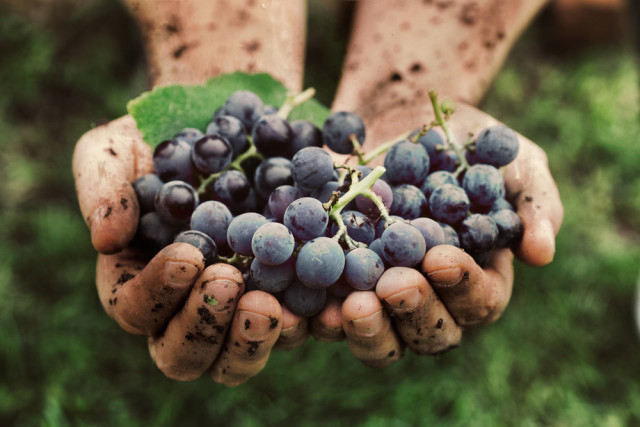
Written by Garrick Dee
Is there something lurking in those berries? And what’s “clean eating?”
Growing up, my parents would always tell me to eat lots of fruits and vegetables because they’re good for me.
I didn’t realize it then how important it was but I do right now.
Fast forward 30 years and I have my own family, and I try to pass on that same love for eating healthy foods on to my son. It isn’t easy, but we try our best to incorporate as much of this into his diet.
Eating lots of fruits and vegetables is good, but if they have a lot of pesticide residue on them, it won’t be as healthy—especially if you eat them raw and unwashed! This stuff is nasty and can lead to several types of cancer down the road, because it accumulates inside the body in a process known as bio-accumulation.
Before I continue here’s a little disclaimer: Surprisingly there is very little information on how pesticide residue on food affects the human health. This article from Harvard.edu says that attracting funding for such a study is difficult because there is no specific health impact to be investigated and people are already exposed to pesticides through the environment and the food they eat.
While the USDA claims pesticide residue in food is safe, Dr. Mercola disagrees.
What I’m stressing in this article is exercising due diligence and minimizing pesticide exposure for the sake of our long term health.
Even if some experts push back and say pesticide level on produce is way below threshold levels…let me ask you—would you drink a glass of water if you know there is even a tiny drop of cyanide or any other poison in it? Think about it for a moment.
And young kids are at bigger risk.
If you have children and they eat a lot of apples or strawberries—listen up— they could also be eating pesticide residue along with it.
Pesticide has a more drastic effect on children as their bodies are still developing, and if they consume or are exposed enough their development would be stunted because pesticides are known endocrine disruptors.
One option is to go all organic, but that would be very expensive. You need information on that will tell you specifically which ones to avoid and shop smarter.
That’s where the dirty dozen comes in.
If you don’t know what this is it is the list of the 12 dirtiest vegetables and fruits based on the amount of pesticide residue based on over 5000 samples taken from grocery stores. This list not only guides you which produce to buy organic but also which ones to buy conventional thanks to the clean fifteen.
If you want additional savings, I’ve added a section in the infographic below that tells you a few places where you can buy organic on the cheap. When I say cheap, I mean cheaper than it would cost than when buy it in a grocery. Even if it’s just a few bucks, it adds up.
Whether you’re buying organic or conventional, make sure to wash and soak them thoroughly for at least 10 minutes to get rid of any dirt and pesticide residue.

Need more reasons to avoid pesticides?
There’s a lot of debate about the negative effects of pesticides, critics of the dirty dozen say that these effects are minimal and should not be taken too seriously but as I dug deeper in my research I found some startling facts that should not be ignored, particularly if you’re an expecting mother.
Over a billion pounds of pesticides are used every year in the United States and most of these have one common ingredient—organophosphates. According to an article by Dr. Mercola, exposure to this chemical has been linked to diseases like Alzheimer’s and Parkinson’s disease, even with minimal exposure because it all adds up.
Direct exposure to organophosphates has a terrible effect on pregnant women and their unborn babies. In a CHAMACOS study done, they followed pregnant women who live in Salinas Valley—a large agricultural land where half a million pounds of organophosphates sprayed every year. They found out that women experienced shorter pregnancies and their children suffered poor neonatal reflexes, lower IQ, shorter attention spans and poor cognitive function.
Pesticides are also known to be carcinogenic which can lead to diseases like cancer. Ever wonder why more and more people suffer from cancer every year? It’s likely due to the environment we live in—we’re bombarded with pesticides from the air we breathe to the food we eat, if we can minimize our exposure to these chemicals, the better our chances of avoiding cancer.
If you’re into eating raw foods or juicing you’d have to be more careful because pesticides with go into your system at full strength in the absence of heat from cooking.
Bonus:
Listen to this Green Divas Radio Show featuring one of our favorite green dudes, Ken Cook, Founder/CEO of EWG, who talked about their new awesome app – Food Scores. Great episode with other folks like Rob Greenfield, dumpster diving to raise awareness of food waste; special Green Divas myEARTH360 featuring Climate Mama; and more! So listen up buttercups!
Listen to the latest Green Divas Radio Show—and other green and healthy living podcasts—daily on GDGDRadio.com (or get the GDGD Radio app)!
 Garrick Dee is the founder of Juicing with G. He created the site because he wanted to document his juicing journey which includes the mistakes he has made so other people looking to go into juicing will avoid it. He also actively researches on related health topics and posts the findings there. You can connect with him on Twitter, Facebook or Google+.
Garrick Dee is the founder of Juicing with G. He created the site because he wanted to document his juicing journey which includes the mistakes he has made so other people looking to go into juicing will avoid it. He also actively researches on related health topics and posts the findings there. You can connect with him on Twitter, Facebook or Google+.
[dynamic-sidebar id=’Custom Widget 2′]
~Asst. Ed. Green Diva Christine | Image via Shutterstock | Infographic via Juicing with G